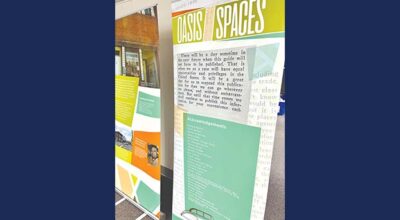Council mulls senior-center funding
Published 8:16 pm Tuesday, November 11, 2014
Deficits in two city-provided service have the Washington City Council looking for ways to reduce, if not eliminate, those deficits.
The deficits — about $225,000 at the Grace Martin Harwell Senior Center and $400,000 at Brown Library — are getting the council’s attention as the council begins preparing for the upcoming budget-preparation season. Council members expressed concern that the senior center and library are used more by people who are not city residents and who do not pay taxes to support those services.
The council spent most of its meeting, which lasted just over 30 minutes, discussing the two deficits. One possible solution that surfaced during the council’s meeting Monday is to charge non-city residents new fees or increase fees they are already paying.
“Mr. Mayor, I looked at these numbers, and it really is disturbing when I have conversations with the (city) manager that says regardless of how much money we lose, if we accept any grant money from any organization that we must open the doors to anybody that comes,” Councilman Mercer said. “Then I said, ‘Well, let’s just not accept the grant money because there’s only $37,000 or $39,000. He said it really doesn’t make any difference. If we open the doors, we’ve got to let anybody come. Is that basically it, Mr. Manager?”
City Manager Brian Alligood replied, “That’s my understanding. When use hold yourself out as a senior center … there’s certain requirements you have to provide to senior citizens at no cost, and you have to be available to do that. You can charge for some things. However, the basic structure of the senior center that’s being provided for those residents has to be available for anyone. Regardless of your location, whether you’re inside the city or outside the city, you have to be able to provide that. It’s based on age, not location.”
Mercer said, “If we open the doors, everyone in North Carolina could come to our center and that would be it. Theoretically, they could.”
Alligood said the city could not prevent non-city residents from using its senior center, “except under certain situations, and those are additional programs. You have to allow people to voluntarily contribute that are participating if they want to, but you can’t make them do that.”
“You can have some offsetting fees to help pay for additional services, but the basic services that are provided, you are not allowed to charge for,” Alligood said.
Alligood said it’s his understanding, based on information received from the Mid-East Commission (a regional planning organization), no other municipality in the area uses its tax dollars to help operate a senior center. The Mid-East Commission provides the funding to operate the senior center in Belhaven, Mercer noted.
“Right now, the City of Washington is the only one funding the senior center. You receive some funding that is passed down through the county from the state, which my understanding comes through federal block grant money,” Alligood said.
He continued, “I’m would be happy to be corrected, but everything that I’ve seen, I don’t see that there are any county tax dollars flowing to the City of Washington to provide senior services for either the citizens of Washington, who are also county residents, or residents outside the city of Washington who participate in that. … You the only one funding that program.”
Alligood noted that state money for programs such as respite care, home-delivered meals and in-home aide services for the elderly flows through the county.
“I short, there’s no county that’s flowing to support the Washington senior center,” he said.
The center has been open since 1994.
“I think what it says is that the City of Washington values senior citizens and wants to provide those services and has, historically, provided those services,” Alligood said.
A city document shows the city’s senior programs are expected to generate $41,180 this fiscal year, but total expenditures are expected to be $266,070, a shortfall of $224,890. The total recreation budget is expected to generate $181,340 in revenue, with total expenditures at $1,370,956, according to the document.
The net cost for recreation programs is $1,189,616.
The document shows that 59 percent of the people participating in programs for senior citizens are Beaufort County residents who do not live in the city, with 41 percent of program participants living in the city.
For additional coverage of the council’s meeting, including discussion about Brown Library’s deficit, see future editions of the Washington Daily News.






